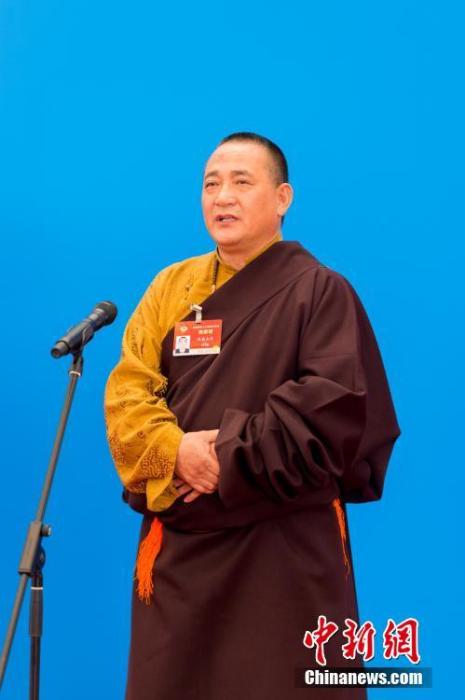(Express delivery of the two sessions) Popular support, networking, and education support: Frontier committee members say "three links"
China News Service, Beijing, March 10th, title: People's support, networking, and education support: Frontier committee members say "three links"
Author Chen Xiangyu Chai Jingbo Wen Mengxin
In the last session of the Fourth Session of the 13th CPPCC National Committee held on the afternoon of the 10th, CPPCC members from Inner Mongolia, Tibet and Xinjiang talked about the "three links" from the perspectives of popular support, networking, and education support.
People are connected: national unity is like sunshine, air and water
"For a unified multi-ethnic country like ours, national unity is the lifeblood of the people of all ethnic groups in our country, just like sunlight, air and water. It benefits without knowing it, but it is difficult to survive if it loses it." Member of the National Committee of the Chinese People's Political Consultative Conference, Inner Mongolia Normal University Said Ala Tancang, deputy secretary of the party committee and principal.
On March 10, the third "Member Channel" interview event of the Fourth Session of the 13th CPPCC National Committee was held in the Press Conference Hall of the Great Hall of the People in Beijing.
The picture shows the National Committee of the Chinese People's Political Consultative Conference, Ala Tancang, accepting media interviews via online video.
Photo by Wang Da of China News Agency
He grew up living in the multi-ethnic Inner Mongolian plateau. The president of the university who came out of the ranch told the story of the “three thousand orphans entering Inner Mongolia” in the last century and the children who donated money to Inner Mongolia during the new crown pneumonia epidemic last year. "In their hearts, Inner Mongolia will always be their home, and Eji in Inner Mongolia will always be their closest mother."
Alatangcang also introduced that in Inner Mongolia, there are many stories of young people from different ethnic groups who have been married and married.
Alatancang said that in the past, Inner Mongolia had only "the sky is blue, the wild is vast, and the wind blows the grass and the cattle and sheep are low".
Nowadays, there are not only vast grasslands, but also prosperous cities, fast-growing economy and speeding high-speed rail.
In the development process, the concept of national unity has been deeply planted in the hearts of every Inner Mongolian.
Grid connectivity: Tibet's Ali unified power grid to open up the "last mile"
The Ali area in Tibet used to be a typical frontier ethnic area and a poor and backward area. The prominent contradiction between power supply and demand is the biggest bottleneck restricting the local economic and social development for a long time.
During the National Two Sessions in 2018, many representatives of Tibet, including Lausanne Shandan, proposed to extend the main line of the Tibet-China power grid to Ali.
On March 10, the third "Member Channel" interview event of the Fourth Session of the 13th CPPCC National Committee was held in the Press Conference Hall of the Great Hall of the People in Beijing.
The picture shows the National Committee of the Chinese People's Political Consultative Conference Lausanne Shandan accepting media interviews through online video.
Photo by Wang Da of China News Agency
Luosang Shandan, a member of the National Committee of the Chinese People's Political Consultative Conference and vice chairman of the CPPCC Ngari Prefecture of Tibet Autonomous Region, introduced that in December last year, the world’s highest power transmission and transformation project—Ali and the Central Tibet Power Grid Interconnection Project was fully put into operation, which marked the opening of Tibet’s unified power grid. The "last mile" has comprehensively improved the power supply problem for hundreds of thousands of local farmers and herdsmen.
"Ali, and even Tibet, have truly realized the connection of circuits, prosperity, and people's hearts."
This year marks the 70th anniversary of Tibet’s peaceful liberation. Speaking of 70 years of changes, Lausanne Shandan gave a set of statistics: In 1959, Tibet’s GDP was only 174 million yuan (RMB, the same below), and the per capita income was only 142 yuan. .
In 2020, Tibet’s GDP reached 190.274 billion yuan, and the per capita disposable income of rural residents reached 14,598 yuan.
Educational integration: support education cadres to improve the level of basic education in Xinjiang
"A hundred-year plan, education is the foundation." Gulipali Abdullah, a member of the National Committee of the Chinese People's Political Consultative Conference and vice president of Xinjiang Normal University, said that since 2016, Xinjiang has sent a large number of cadres to rural areas in southern Xinjiang to support education. Five years have passed. The work of supporting education has played an important role in improving the level of basic education in Xinjiang, and has brought earth-shaking changes to the basic education work in Xinjiang.
On March 10, the third "Member Channel" interview event of the Fourth Session of the 13th CPPCC National Committee was held in the Press Conference Hall of the Great Hall of the People in Beijing.
The picture shows Gulipari Abdullah, a member of the National Committee of the Chinese People's Political Consultative Conference, being interviewed by the media through online video.
Photo by Wang Da of China News Agency
She also said that when chatting with the teaching cadres, the most common phrase they said was "Love can change everything."
All these changes are the source of happiness and the meaning of education for all the teaching support teachers.
"As an educator, I am willing to pass on love with everyone," she said.
(Finish)

